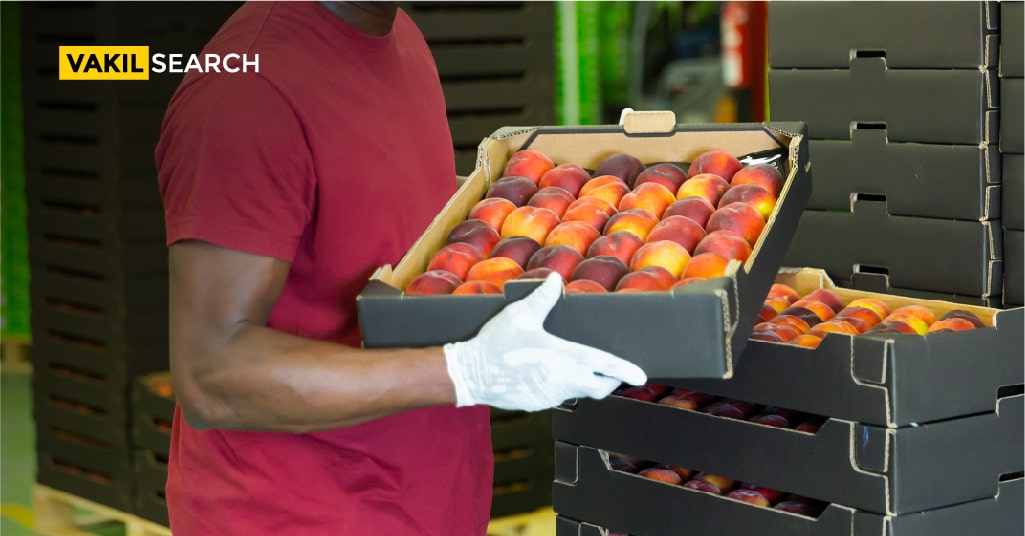India has several laws in place to help ensure that the food sold in the country is safe and hygienic. FSSAI Act is one of the basic and most important of those laws. If you are starting/running a fruit company, you need an FSSAI license and here is how you can get one.
The Food Safety and Standard Authority of India (FSSAI) is the most important authority in India that regulates and handles all food complaints. If you’re planning to start a fruit business in India, obtaining an FSSAI license is mandatory. The type of fruit license you’ll need, can be basic registration, state license, or central license, depends on your business’s annual turnover and scale of operations. In this article, we will take you through the complete process of obtaining a fruits license, explain the eligibility criteria for fruits registration, and help you understand the documentation and procedure to get fssai license to keep your fruits business run legally.
Benefits of Getting an FSSAI License for Fruits and Vegetables Business
- Helps you improve your food safety policies by providing a definite guideline or framework to follow
- Gives you access to research studies and evidence which can help you better your food standards
- Provides new and updated knowledge, bringing advancement to your food safety standards
- Aids businesses in reaching international benchmarks for food safety and security
- Provides immense credibility and helps a business attract and retain more customers
- Helps build a strong relationship with buyers by assuring them of the quality of your products
- Enables you to carry out your business without any legal hassles.
Documents Required for FSSAI License for Fruits and Vegetables
1. FSSAI Registration
- ID proof
- Passport-sized photograph
2. State or Central License
- ID proof
- Proof of address
- Import/export code
- Passport-sized photograph
- List of all the directors or partners
- Certificate of incorporation
- MoA and AoA
- NOC from the municipality
How to Obtain an FSSAI License for a Fruit Company?
- First and foremost, you will have to decide on what type of license you need to procure
- If you have any questions or concerns about this, please contact our legal team. They will answer all of your questions and advise you on whatever license you require
- Once you know which license you require, collect all the necessary documents for applying
- Next, double-check all your paperwork and file for an FSSAI license through Vakilsearch
- In case the authorities need further proof, have any questions, or want to inspect the premises, you will need to facilitate their demands
- The process of approval might take up to 20 days for a basic license
- Once approved, a digital and paper copy of the license will be sent to your address.
FSSAI’s Clean and Fresh Fruit and Vegetable Market Initiative
The FSSAI launched this initiative to ensure the availability of hygienic fruits and vegetables across the nation. It aims to upgrade the unorganized retail sector consisting of pavement vendors and pushcart fruit sellers, by integrating them with organized retailers, such as Big Bazaar, Amazon Fresh, and more. Both the unorganized sector as well as the organized sector will benefit significantly from this initiative.
Here’s a quick look at the basic guidelines of the program:
- All fruit and vegetable vendors must register under the Food Safety and Standards Regulations, 2011
- The vendor must display their FSSAI license number with the appropriate green colour code in their shop, cart, or kiosk
- Such vendors may not sell fruits ripened artificially by using carbide or acetylene gas
- Stickers that do not contain relevant information should not be used directly on the products
- All fruits and vegetables must be free from harmful chemicals, mineral oil, and other colouring material
- Only beeswax, carnauba wax, or shellac wax may be used to apply a coat of wax on the fruit, and every package must have the following label: ‘Coated with Wax <Name of Wax>’
- All such vendors must position their cart or kiosk away from zones of high environmental pollution
- A third-party laboratory must analyze the quality of the water used, to ensure safety every six months
- The vendors must maintain records of details regarding their suppliers.
After implementing the changes, the FSSAI panel will conduct another audit to ensure compliance with food safety standards. Moreover, if found eligible the market or vendor will receive a clean and fresh fruit and vegetable market certification for one year. Thereafter, the office will conduct routine monthly checkups to ensure the maintenance of standards.
Under this project, local authorities will recommend suitable markets and vendors to the FSSAI. The State FDA officials will then audit and inspect the premises to understand its requirements. The officials will then implement the changes required and train the vendors to follow the guidelines mentioned above.
How VakilSearch Can Assist You?
- Our legal team will advise you on which FSSAI fruit license to get depending on the nature and size of your business
- We will then correct and verify all the required documents, including the category list, Form B, and NOC
- After verifying all the documents, we will file an FSSAI license application for you
- We will keep you updated every step of the way regarding the processes involved
- Finally, we will help you procure the FSSAI license for your fruit business and ensure that you enjoy all the benefits that come with it.



